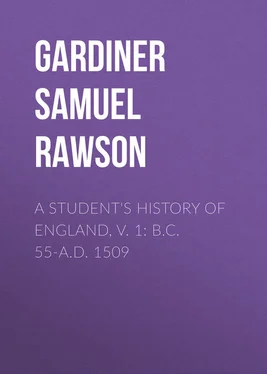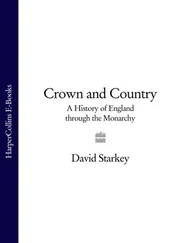Samuel Gardiner - A Student's History of England, v. 1 - B.C. 55-A.D. 1509
Здесь есть возможность читать онлайн «Samuel Gardiner - A Student's History of England, v. 1 - B.C. 55-A.D. 1509» — ознакомительный отрывок электронной книги совершенно бесплатно, а после прочтения отрывка купить полную версию. В некоторых случаях можно слушать аудио, скачать через торрент в формате fb2 и присутствует краткое содержание. Издательство: Иностранный паблик, Жанр: foreign_prose, История, foreign_antique, на английском языке. Описание произведения, (предисловие) а так же отзывы посетителей доступны на портале библиотеки ЛибКат.
- Название:A Student's History of England, v. 1: B.C. 55-A.D. 1509
- Автор:
- Издательство:Иностранный паблик
- Жанр:
- Год:неизвестен
- ISBN:нет данных
- Рейтинг книги:5 / 5. Голосов: 1
-
Избранное:Добавить в избранное
- Отзывы:
-
Ваша оценка:
- 100
- 1
- 2
- 3
- 4
- 5
A Student's History of England, v. 1: B.C. 55-A.D. 1509: краткое содержание, описание и аннотация
Предлагаем к чтению аннотацию, описание, краткое содержание или предисловие (зависит от того, что написал сам автор книги «A Student's History of England, v. 1: B.C. 55-A.D. 1509»). Если вы не нашли необходимую информацию о книге — напишите в комментариях, мы постараемся отыскать её.
A Student's History of England, v. 1: B.C. 55-A.D. 1509 — читать онлайн ознакомительный отрывок
Ниже представлен текст книги, разбитый по страницам. Система сохранения места последней прочитанной страницы, позволяет с удобством читать онлайн бесплатно книгу «A Student's History of England, v. 1: B.C. 55-A.D. 1509», без необходимости каждый раз заново искать на чём Вы остановились. Поставьте закладку, и сможете в любой момент перейти на страницу, на которой закончили чтение.
Интервал:
Закладка:
22. The Kymry.—It is probable that the cause of the slow advance of the northern Angles lay in the existence of a strong Celtic state in front. Welsh tradition speaks of a ruler named Cunedda, who after the departure of the Roman legions governed the territory from the Clyde to the south of Wales, which formed the greater part of what had once been known as Upper Britain. (See p. 25.) This territory was inhabited by a mixed population of Britons and Goidels, with an isolated body of Picts in Galloway. A common danger from the English fused them together, and as a sign of the wearing out of old distinctions, they took the name of Kymry, or Comrades, the name by which the Welsh are known amongst one another to this day, and which is also preserved in the name of Cumberland, though the Celtic language is no longer spoken there.
23. Britain at the End of the Sixth Century.—During the sixth century the Kymry ceased to be governed by one ruler, but the chieftains of the various territories all acknowledged the supremacy of a descendant of Cunedda. For purposes of war they combined together, and as the country which they occupied was hilly and easily defended, the northern English discovered that they too must unite amongst themselves if they were to overpower the united resistance of the Kymry.
CHAPTER III.
THE STRIFE OF THE ENGLISH KINGDOMS
Augustine's mission 597
Æthelfrith's victory at Chester 613
Penda defeats Eadwine at Heathfield 633
Penda's defeat at Winwæd 655
Theodore Archbishop of Canterbury 668
Offa defeats the West Saxons at Bensington 779
Ecgberht returns to England 800
Death of Ecgberht 839
1. England and the Continent.—Whatever may be the exact truth about the numbers of Britons saved alive by the English conquerors, there can be no doubt that English speech and English customs prevailed wherever the English settled. In Gaul, where the German Franks made themselves masters of the country, a different state of things prevailed. Roman officials continued to govern the country under Frankish kings, Roman bishops converted the conquerors to Christianity, and Roman cities maintained, as far as they could, the old standard of civilisation. All commercial intercourse between Gaul, still comparatively rich and prosperous, and Britain was for some time cut off by the irruption of the English, who were at first too rude and too much engaged in fighting to need the products of a more advanced race. Gradually, however, as the English settled down into peaceful industry along the south-eastern shores of the island, trade again sprang up, as it had sprung up in the wild times preceding the landing of Cæsar. The Gaulish merchants who crossed the straits found themselves in Kent, and during the years in which the West Saxon Ceawlin was struggling with the Britons the communications between Kent and the Continent had become so friendly that in 584, or a little later, Æthelberht, king of Kent, took to wife Bertha, the daughter of a Frankish king, Charibert. Bertha was a Christian, and brought with her a Christian bishop. She begged of her husband a forsaken Roman church for her own use. This church, now known as St. Martin's, stood outside the walls of the deserted city of Durovernum, the buildings of which were in ruins, except where a group of rude dwellings rose in a corner of the old fortifications. In these dwellings Æthelberht and his followers lived, and to them had been given the new name of Cantwarabyrig or Canterbury ( the dwelling of the men of Kent ). The English were heathen, but their heathenism was not intolerant.
2. Æthelberht's Supremacy.—Æthelberht's authority reached far beyond his native Kent. Within a few years after his marriage he had gained a supremacy over most of the other kings to the south of the Humber. There is no tradition of any war between Æthelberht and these kings, and he certainly did not thrust them out from the leadership of their own peoples. The exact nature of his supremacy is, however, unknown to us, though it is possible that they were bound to follow him if he went to war with peoples not acknowledging his supremacy, in which case his position towards them was something of the same kind as that of a lord to his gesiths.
3. Gregory and the English.—Æthelberht's position as the over-lord of so many kings and as the husband of a Christian wife drew upon him the attention of Gregory, the Bishop of Rome, or Pope. Many years before, as a deacon, he had been attracted by the fair faces of some boys from Deira exposed for sale in the Roman slave-market. He was told that the children were Angles. "Not Angles, but angels," he replied. "Who," he asked, "is their king?" Hearing that his name was Ælla, he continued to play upon the words. "Alleluia," he said, "shall be sung in the land of Ælla." Busy years kept him from seeking to fulfil his hopes, but at last the time came when he could do something to carry out his intentions, not in the land of Ælla, but in the land of Æthelberht. He became Pope. In those days the Pope had far less authority over the Churches of Western Europe than he afterwards acquired, but he offered the only centre round which they could rally, now that the Empire had broken up into many states ruled over by different barbarian kings. The general habit of looking to Rome for authority, which had been diffused over the whole Empire whilst Rome was still the seat of the Emperors, made men look to the Roman Bishop for advice and help as they had once looked to the Roman Emperor. Gregory, who united to the tenderheartedness of the Christian the strength of will and firmness of purpose which had marked out the best of the Emperors, now sent Augustine to England as the leader of a band of missionaries.
4. Augustine's Mission. 597.—Augustine with his companions landed at Ebbsfleet, in Thanet, where Æthelberht's forefathers had landed nearly a century and a half before. After a while Æthelberht arrived. Singing a litany, and bearing aloft a painting of the Saviour, the missionaries appeared before him. He had already learned from his Christian wife to respect Christians, but he was not prepared to forsake his own religion. He welcomed the new-comers, and told them that they were free to convert those who would willingly accept their doctrine. A place was assigned to them in Canterbury, and they were allowed to use Bertha's church. In the end Æthelberht himself, together with thousands of the Kentish men, received baptism. It was more by their example than by their teaching that Augustine's band won converts. The missionaries lived 'after the model of the primitive Church, giving themselves to frequent prayers, watchings, and fastings; preaching to all who were within their reach, disregarding all worldly things as matters with which they had nothing to do, accepting from those whom they taught just what seemed necessary for livelihood, living themselves altogether in accordance with what they taught, and with hearts prepared to suffer every adversity, or even to die, for that truth which they preached.'
5. Monastic Christianity.—These missionaries were monks as well as preachers. The Christians of those days considered the monastic life to be the highest. In the early days of the Church, when the world was full of vice and cruelty, it seemed hardly possible to live in the world without being dragged down to its wickedness. Men and women, therefore, who wished to keep themselves pure, withdrew to hermitages or monasteries, where they might be removed from temptation, and might fit themselves for heaven by prayer and fasting. In the fifth century Benedict of Nursia had organised in Italy a system of life for the monastery which he governed, and the Benedictine rule, as it was called, was soon accepted in almost all the monasteries of Western Europe. The special feature of this rule was that it encouraged labour as well as prayer. It was a saying of Benedict himself that 'to labour is to pray.' He did not mean that labour was good in itself, but that monks who worked during some hours of the day would guard their minds against evil thoughts better than if they tried to pray all day long. Augustine and his companions were Benedictine monks, and their quietness and contentedness attracted the population amidst which they had settled. The religion of the heathen English was a religion which favoured bravery and endurance, counting the warrior who slaughtered most enemies as most highly favoured by the gods. The religion of Augustine was one of peace and self-denial. Its symbol was the cross, to be borne in the heart of the believer. The message brought by Augustine was very hard to learn. If Augustine had expected the whole English population to forsake entirely its evil ways and to walk in paths of peace, he would probably have been rejected at once. It was perhaps because he was a monk that he did not expect so much. A monk was accustomed to judge laymen by a lower standard of self-denial than that by which he judged himself. He would, therefore, not ask too much of the new converts. They must forsake the heathen temples and sacrifices, and must give up some particularly evil habits. The rest must be left to time and the example of the monks.
Читать дальшеИнтервал:
Закладка:
Похожие книги на «A Student's History of England, v. 1: B.C. 55-A.D. 1509»
Представляем Вашему вниманию похожие книги на «A Student's History of England, v. 1: B.C. 55-A.D. 1509» списком для выбора. Мы отобрали схожую по названию и смыслу литературу в надежде предоставить читателям больше вариантов отыскать новые, интересные, ещё непрочитанные произведения.
Обсуждение, отзывы о книге «A Student's History of England, v. 1: B.C. 55-A.D. 1509» и просто собственные мнения читателей. Оставьте ваши комментарии, напишите, что Вы думаете о произведении, его смысле или главных героях. Укажите что конкретно понравилось, а что нет, и почему Вы так считаете.












